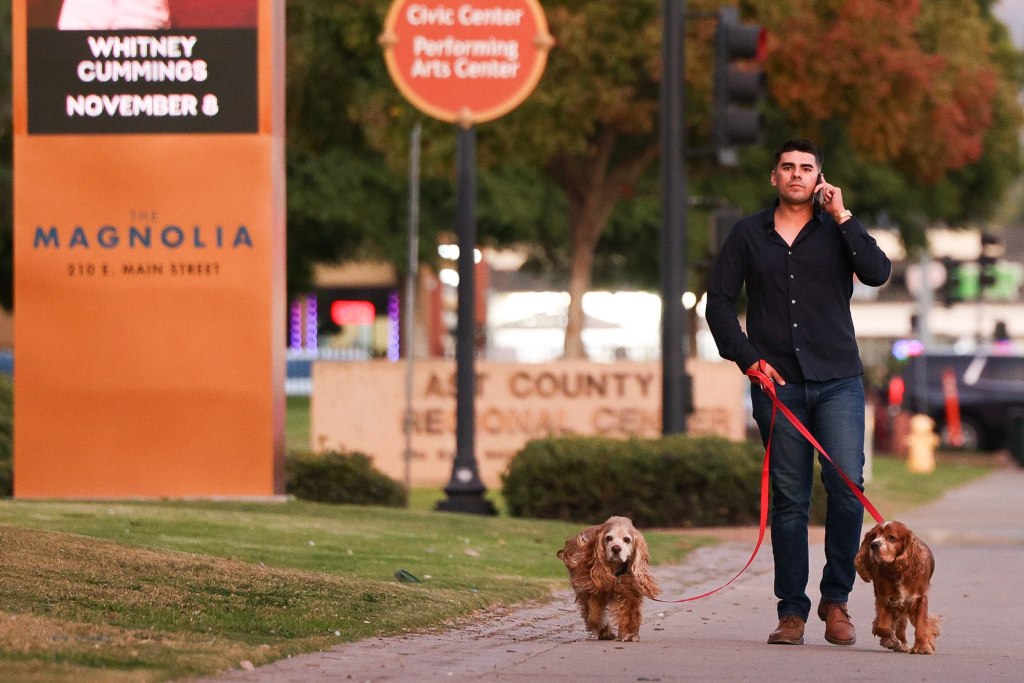

If it’s true that every dog has its day, that day may finally have arrived in El Cajon.
On Tuesday, El Cajon City Council members unanimously agreed to change a municipal code that has prohibited dogs from a large section of downtown since 1997.
Some council members said they were surprised to learn the prohibition existed.
“I would be very disingenuous if I were to continue this prohibition because I’ve a house full of animals and, for me, I didn’t know that it was prohibited,” said Councilmember Michelle Metschel. “I brought my big dog down many times and have eaten at the restaurants down here with my dog, so yes, I agree we need to remove the prohibition.”
After a speaker addressed the council in favor of lifting the prohibition, Councilmember Phil Ortiz thanked the man for bringing it to their attention some weeks ago.
“I’m almost positive you’re the one that brought this up to us after a meeting,” he said. “You walked up to Michelle and I over here and said, ‘Hey, did you know that you’re not allowed to have dogs in the downtown area?’ Michelle and I said, ‘No way.’”
In introducing the proposed change, Assistant City Manager Vince DiMaggio said the city had received “more than a few telephone calls and emails” questioning whether the ordinance was real and whether it could be amended.
The prohibition applies to a city area known as the superblock, which includes Prescott Promenade, Centennial Plaza, the Civic Center, the Library and Judson Park.
DiMaggio said he and City Manager Graham Mitchell see dozens of people walking their dogs through the Civic Center daily, probably unaware they are violating a law.
The ordinance was adopted in 1997 based on the perception that dogs would pose a health hazard and lead to frequent and ongoing maintenance issues, according to a staff report.
“None of the issues perceived to have been of concern, in fact, have materialized,” DiMaggio said.
Attitudes about dogs have changed over the years, the staff report said.
“With the passage of time, dogs have become a much more accepted part of the social fabric in the community and are seen frequently at community events,” the report said. “The use of dogs as service animals in a variety of capacities, which was virtually unheard of in 1997 (except for the visually-impaired), is now commonplace.”
The ordinance change will take effect after its second reading in December.
This was the second time in two months that the City Council has moved to repeal a decades-old prohibition on activities downtown.
In October, the council directed the Planning Commission to return with a recommendation to lift a restriction on the number of bars in downtown El Cajon.
Councilmember Michelle Metschel on Tuesday wondered what was happening in El Cajon during the 1990s.
“What was going on in ’97?” she said. “We had closed down all the bars, we closed down smoking, we closed down dogs. What else did we close down in the ’90s?”
The city staff report on the ordinance noted that the prohibition had a “nominal benefit” for the police department because it could be used to remove homeless encampments from parks if dogs were present. The report also noted that the police chief said that would not be a problem because other laws would accomplish the same purpose.
Despite the little-known ban, El Cajon appears to be a dog-friendly city, and residents even attempted to set a world record for most dogs watching a movie in February. The event at Wells Park featured the film “Beethoven,” but the attempt fell short.
Originally Published:





